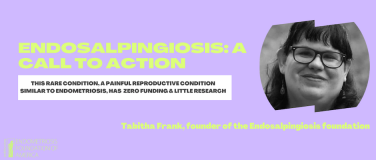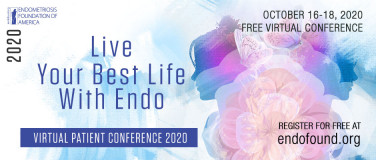
Trigger warning: discussion of eating disorders.
Chances are that if you or a loved one has or is suspected to have endometriosis, you've heard a few of the following suggestions:
"Just cut out gluten, dairy, and alcohol - you'll feel so much better."
"You should think about going sugar-free."
"Anti-inflammatory diets are a must for anyone with endometriosis."
These kinds of statements may be offered with the best of intentions, but there is a subset of the population prone to developing eating disorders for which this kind of advice can be harmful.
Anti-inflammatory eating is touted as an excellent option for improving endo symptoms. For instance, Healthline states that, "To fight inflammation and pain caused by endometriosis, it’s best to consume a nutrient-dense, well-balanced diet that’s primarily plant-based and full of vitamins and minerals." This kind of diet-as-treatment approach isn't exclusive to people living with endometriosis, as folks living with conditions like diabetes or celiac disease can attest. Making changes to your diet may improve your symptoms, though it should be noted that diet cannot cure endometriosis.
According to Dr. Jillian Lampert, Ph.D., Chief Strategy Officer for the Emily Program, "Anyone with a chronic condition that is somehow related to nutritional and dietary recommendations may be at a higher risk of developing an eating disorder."
Eating disorders are complex, but Dr. Lampert explains that they boil down to the need to exercise some control over our circumstances. When it comes to life with a chronic illness like endometriosis, it can frequently feel like everything is out of your control. This is even more complicated for patients already living with an eating disorder who are subsequently diagnosed with endometriosis. For those patients, who may have worked hard to manage their eating disorder, an introduction of a chronic illness and associated dietary plan could jeopardize their progress if not introduced by an informed provider.
The diet-as-treatment approach is less dangerous when framed as a choice. Anne Cuthbert, MA, LPC treats patients with eating disorders at her Portland and Vancouver-based practice, Food is Not the Enemy. She explained, "If [a patient] is equipped with the knowledge that they can choose what to eat—even if they know they may feel like crap afterwards—they will often choose not to suffer the consequences. Take away that choice and feed the voice that tells you you're bad for eating that food in the first place? That will lead to negative consequences."
Endometriosis can cause debilitating pain and nausea, limit ability to exercise, and lead to severe bloating. Any one of these challenges can be difficult to cope with, but all together, they can negatively impact body image. For those prone to developing eating disordered behavior, changing diet or eating patterns might feel like a way to manage the much larger, amorphous challenges of chronic illness.
Cuthbert shares that, "[Eating disorder] patients often feel that if they follow the 'rules,' everything will be okay and they won't have any more issues." For people with endo, this can ring especially true. Because there is still relatively little known about endometriosis, patients can cling to suggestions like dietary changes as the solution for their complicated illness. Micromanaging diet and eating habits can seem like an accessible way of controlling otherwise uncontrollable circumstances. Though these dietary changes may improve symptoms, they cannot cure the disease.
Eating disorders are serious for everyone, not just for those already suffering from a chronic illness. According to the National Association of Anorexia Nervosa and Associated Disorders, eating disorders are the second deadliest mental illness after opioid overdose and lead to an estimated one death every 52 minutes. BIPOC eating disorder patients are 50% less likely to be asked about symptoms by a physician than white peers, compounding the already disparate care that many BIPOC endo patients experience. Trans college students report disordered eating behavior at four times the rate of their cis peers, creating a great risk for those already suffering from endometriosis.
So what can you do if you or a loved one is exhibiting signs of an eating disorder? First, understand eating disorders have emotional root causes, and even the most fastidious patient may need assistance. It's okay to ask for help—and according to Dr. Lampert, you should. She suggests that if you're struggling with symptoms of an eating disorder, you should:
-
Seek out a treatment program (if there isn't one available in your area, there are telehealth options!)
-
Read as much as you can about eating disorders and ask your loved ones to do the same so they can best support you. Sources like Academy for Eating Disorders, Eating Disorders Coalition, and the National Eating Disorders Association are great places to start.
-
Pay close attention to the things that help you (like eating lunch with a friend over FaceTime) and the things that don't (like when a loved one makes comments about your food). The more you understand about your own behaviors, the more you can share with your support system.
Dr. Lampert also suggests developing a mindfulness practice. "It's all about learning how to nourish who you are outside of your body. Staying connected from a mindfulness perspective works because it helps you find your 'true you.'" Yoga, mindful walking, and seated meditation can all help to ground you. Don't feel like you need to push yourself at the gym on bad pain days; gentle movement can lower anxiety associated with chronic pain and eating disorders alike.
If you're struggling with an eating disorder, let your endo provider know. Dr. Lampert suggests being direct by framing it this way: "[Provider], here's what I find particularly helpful to me in my recovery. I'm concerned that the methods I use will conflict with your recommendations. I need us to work together to find a situation that works best for me."
Providers themselves can work to be more eating-disorder friendly when discussing dietary changes. By framing the changes as a choice to be made by the patient—one that will not cure the disease but may improve symptoms—they can help support those already struggling with the diet mentality.
Cuthbert condensed it simply: "Trying to control your body only leads to more pain." Endo patients are no strangers to pain. If eating disorder symptoms are causing more, seek support and know that you are not alone.









